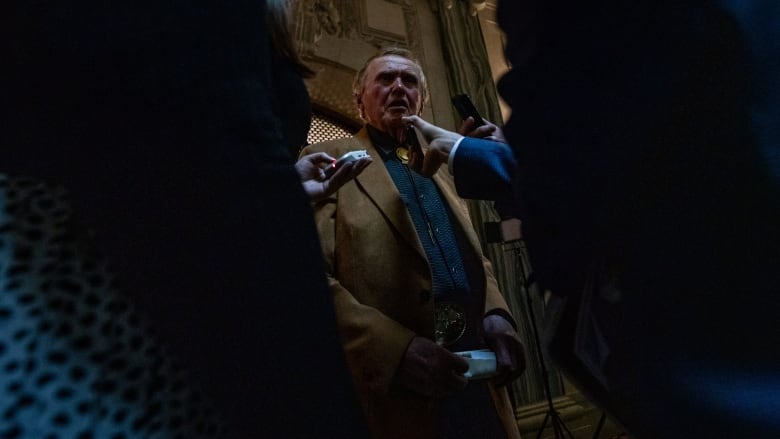Thatcher's invitation draws different messages from Sask. government MLA, minister, premier
MLA says invite was an 'error,' minister of corrections says Thatcher had the right to attend

Saskatchewan Party MLA Lyle Stewart's decision to invite his "longtime friend," convicted murderer Colin Thatcher, to this week's throne speech resulted in varying messages from Stewart, Minister of Corrections Christine Tell and Premier Scott Moe.
On Wednesday, Thatcher sat on the assembly floorwhile Lt.-Gov. Russ Mirasty, the former commanding officer of the Saskatchewan RCMP, delivered the government's speech to open the fall sitting of the legislature.
Thatcher, 84, sat in a brown jacket and bolo tie. He is no stranger to the assembly, having been elected as an MLA in 1975and serving in cabinet until 1983.
In 1983, four days after Thatcher steppeddown from cabinet, his ex-wife JoAnn Wilson was found beaten and shot to death in the garage of her Regina home.
Thatcher was found guilty the next year of first-degree murderand sentenced to life in prison. He was released on parole in 2006 after 22 years behind bars and has maintained his innocence.
The speech Thatcher and the hundreds of other guests and dignitaries heard Wednesday included a tough-on-crime message. The government said it plans to create a Saskatchewan Marshals Service and add to existing policing teams.
It also took time to criticize the federal government's treatment of violent criminals.
"Many Saskatchewan residents see the federal government as too lenient on violent offenders who commit gun crimes and too focused on punishing law-abiding gun owners," Mirasty read.
"This session, my government will take significant action to crack down on the illegal and violent use of firearms in the commission of crimes to ensure families feel safe in their communities. We will do this while also defending the rights of lawful and responsible firearms owners."
After the speechMickey Djuric, a reporter with The Canadian Press, caught up with Thatcher and Stewart at a reception held for guests.
"Colin was a longtime MLA, and he's a constituent of mine and a friend of mine and that's why I [invited him] and I'm happy that I did," Stewart told Djuric.
"If anybody has a right to be here, it's Colin Thatcher."
Stewart said Thatcher was"a fine individual" and has had a tough life because of his time in prison.
Ministerof corrections incorrectly saysparolee Thatcher 'free'
After the speech on Wednesday, Minister of Corrections, Policing, and Public Safety Christine Tell was asked about Thatcher's presence.
"He has a right to be here just like anyone else. He is a free citizen," said Tell, a former Regina Police officer.
"Colin Thatcher is a citizen who has gone through the justice system, gone through the courts, did his time in incarceration. He has now paid the debt to society that society has deemed and he is living his life as a citizen of our province.
"Colin is not somebody who is active on warrants, has anything to do with the justice system at this point in time. He is free to come and go."
However, Thatcher was granted parole in 2006 after serving 22 years. He remains on parole and, contrary to what Tell said, he can be sent back to jail if he breaches his conditions.
Tell was asked if it sent the wrong message to have Thatcher attend a throne speech that featured a tough-on-crime message.
"Not at all. He is infamous if I can use that word. There are other people that may be convicted of crimes that may be in the building. I don't know and I don't care."
Stewart calls invitation 'error in judgment'
Stewart released a statement on Thursday morning regarding his invitation to Thatcher.
"It was my decision alone to invite Colin Thatcher, who is a constituent and long-time friend. In retrospect, this was an error in judgment as his presence was a distraction from a very positive and forward-looking Throne Speech," Stewart said in a statement.
Stewart has represented the constituency of Lumsden-Morse/Thunder Creek since 1999. Thatcher held the Thunder Creek seat from 1975 untilhis sentencing in 1984.
After question period on Thursday, Premier Scott Moe's message was noticeably different than what Tell told reporters on Wednesday.
He distanced himself from the decision to invite Thatcher, said he did not "vet" any guest list and called Thatcher's presence "unfortunate."
"The fact of the matter is we had an individual MLA extend that invitation. I most certainly would not have extended that invitation."
Moe said the controversy "overshadowed" the province's throne speech and its plan to increase police resources.
Opposition Leader Carla Beck called on Moe to apologize.
"I believe that Stewart suggested that if anyone had a right to be here it was Colin Thatcher. That is a quote that will go down in infamy in this province for its appalling lack of sensitivity," Beck said.
She said the invitation should have sent up a "red flag" within the government and that she did not believe that Thatcher's attendance was unknown to those in government.
Beck said she was bothered that the government seemed more upset about its agenda being overshadowed than about "the message they sent by inviting and defending having a convicted wife killer on the floor of the assembly."
Beck's caucus colleague Jennifer Bowes read the details of Wilson's murder into the legislative record on Thursday, and asked questions about Thatcher's invitation and the message it sent to victims of interpersonal violence.
According to Statistics Canada data from 2019, Saskatchewan has the highest rate of reported intimate partner violence among all provinces and more than double the national rate.
Thatcher's appearance in the legislative assembly came days after the provincial government declared Oct. 24 to 28 Violence Prevention Week.
Listen to The Morning Edition political panel discuss Colin Thatcher's invitation to the throne speech
with files from The Canadian Press and CBC News












_(720p).jpg)


 OFFICIAL HD MUSIC VIDEO.jpg)
.jpg)



























































































